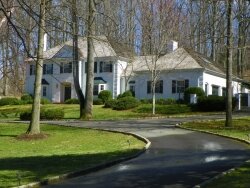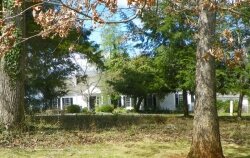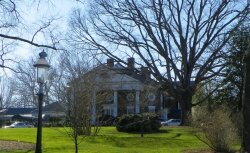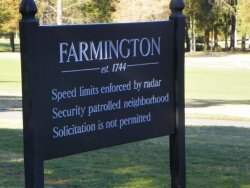Spotlight on Farmington
-
 Samantha Masone
Samantha Masone -
 2045 Dogwood Lane, 5 BR, 5 full & 2 half-baths, 10,890 sq. ft., 8.29 acres, asking price: $5,900,000, assessment: $5,636,100, Robert Headrick, Nest Realty Group, 434-242-8501Samantha Masone
2045 Dogwood Lane, 5 BR, 5 full & 2 half-baths, 10,890 sq. ft., 8.29 acres, asking price: $5,900,000, assessment: $5,636,100, Robert Headrick, Nest Realty Group, 434-242-8501Samantha Masone -
 485 Oak Circle, 5 BR, 4 full & 1 half-bath, 6191 sq. ft., 2.40 acres, asking price: $2,795,000, assessment: $1,720,800, Jim Faulconer, McLean Faulconer, Inc., 434-981-0076Samantha Masonea
485 Oak Circle, 5 BR, 4 full & 1 half-bath, 6191 sq. ft., 2.40 acres, asking price: $2,795,000, assessment: $1,720,800, Jim Faulconer, McLean Faulconer, Inc., 434-981-0076Samantha Masonea -
 675 Ivy Lane, 4 BR, 3 full & 1 half-bath, 7817 sq. ft., 2.00 acres, asking price: $1,750,000, assessment: $1,432,300, Betsy Swett, McLean Faulconer, Inc., 434-249-2922Samantha Masone
675 Ivy Lane, 4 BR, 3 full & 1 half-bath, 7817 sq. ft., 2.00 acres, asking price: $1,750,000, assessment: $1,432,300, Betsy Swett, McLean Faulconer, Inc., 434-249-2922Samantha Masone -
 2435 North Dogwood Lane, 3 BR, 3 full & 1 half-bath, 3887 sq. ft., 4.28 acres, asking price: $1,275,000, assessment: $1,094,700, Jim Faulconer, McLean Faulconer, Inc., 434-981-0076Samantha Masone
2435 North Dogwood Lane, 3 BR, 3 full & 1 half-bath, 3887 sq. ft., 4.28 acres, asking price: $1,275,000, assessment: $1,094,700, Jim Faulconer, McLean Faulconer, Inc., 434-981-0076Samantha Masone -
 935 Windsor Road, 5 BR, 3 full & 1 half-bath, 4800 sq. ft. , 2.56 acres, asking price: $995,000, assessment: $918,500, Elizabeth Feil Matthews, McLean Faulconer, Inc., 434-284-2105Samantha Masone
935 Windsor Road, 5 BR, 3 full & 1 half-bath, 4800 sq. ft. , 2.56 acres, asking price: $995,000, assessment: $918,500, Elizabeth Feil Matthews, McLean Faulconer, Inc., 434-284-2105Samantha Masone -
 The clubhouse at FarmingtonSamantha Masone
The clubhouse at FarmingtonSamantha Masone -
 Samantha Masone
Samantha Masone -
 Samantha Masone
Samantha Masone
Area: Farmington
Price range: $575,000-$5,900,000
Schools: Murray, Henley, Western Albemarle
Pros: location, amenities, beautiful neighborhood
Cons: high cost of ownership, close identification with club
“Farmington is primarily identified by the club,” says Elizabeth Feil Matthews, a realtor with McLean Faulconer and listing agent for the home that sits at 935 Windsor Road.
The club Matthews refers to was built sometime prior to 1780 on land confiscated from Francis Jerdone, a Tory. Mr. Jerdone regained ownership of his estate and sold it in 1785 to George Divers, who obtained plans drawn by Thomas Jefferson to augment the home with the addition of a two-room octagonal structure.
The notion of transforming the Farmington estate of nearly 1,000 acres into a club first materialized in 1927, and the vision became a reality on May 15, 1929 when Farmington Country Club officially opened its doors. While club policy long banned minorities, a revolt at UVA launched in 1973 by then-Student Council president and now esteemed Politics Professor Larry Sabato– detailed in a 2001 UVA publication titled "Beyond Black and White" – led to the club changing its membership policy after its members purchased the club in 1979.
Nowadays, membership is open to all races, creeds, nationalities and genders but it's still by invitation only, unless you happen to buy a home in the neighborhood.
“You don’t have to be a member to buy in Farmington,” Matthews says. “But you’re eligible [to join] if you do, and some people make the club their social scene, as well.”
Club amenities, which include a variety of dining options and social activities, a pool, tennis courts, a fitness center and a Fred Findlay-designed golf course, are certainly a draw for a number of buyers, who pay up to $18,500 to join, and up to $600 per month in dues for club membership. But there are additional features that Elizabeth Feil Matthews believes set it apart.
“It’s a beautiful neighborhood, the homes are well-built and secure, and there’s not a lot of turnover. It means a lot to have a community where people can walk and run and be safe, and it’s nice to have dining and entertainment availbable right here in the subdivision.”
“There are certainly other upscale neighborhoods to choose from,” she says, “and the cost to get into them is often comparable, but the location, the easy access to UVA and the quality of the amenities help set Farmington apart.”
So what is the cost of buying into the Farmington community?
The MLS reports nine sales in Farmington over the past two years with prices between $575,000 and $2,100,000, well above the Albemarle County median sales price of $290,000. Currently, there are five houses for sale in Farmington with prices ranging from $999,000 to $5,900,000, figures that preclude the majority of buyers.
Farmington residents aren’t saddled with overly steep HOA dues, however. Covering upkeep of the common areas, road maintenance (including snow removal), and security, the dues are a modest $600 per year. Of course, club membership costs, greens fees, and dining expenses are significantly more.
But the prices are obviously not a deterrent for some. Matthews observes, “There are always buyers waiting for a house in Farmington. It’s a highly desirable area and an excellent real estate investment.”
As to the distinction between Farmington and Farmington Heights, Matthews points out that the homes accessed through the back entrance and situated along the East 9 share both the Farmington address and the association with the country club.
With stately homes that date to the late 1920’s, spacious, park-like lots, and meticulously maintained grounds, what’s not to like about Farmington? For those who want their showcase home and social scene wrapped up in views of a rolling golf course with mountains beyond, there’s a lot to like here.
On a practical note, however, there’s the inconvenience of the railroad that runs along the front entrance and sometimes blocks access to the multi-million-dollar mansions situated on the wrong side of the tracks.
Perhaps less tangible is the potential objection some buyers may have to the aforementioned association between the neighborhood and the club. As Elizabeth Feil Matthews observes, “Not everyone wants to be involved in a country club.”
20 comments
If this piece were submitted by one of my students, we would be having a class-wide discussion about audience, purpose, and tone. Who is this written for? Why? What about, "Nowadays, membership is open to all races, creeds, nationalities and genders but it's still by invitation only, unless you happen to buy a home in the neighborhood."
All genders?
Also, am I supposed to be impressed that the country club no longer blatantly discriminates?
Ah I see there's much more racial sensitivity when it's fee-paid space. Funny that racial slurs lingered on another discussion but zero tolerance for poking at Mr Charlie here.
Indeed, the Hook needs an editor. Use of the word "preclude" here is incorrect:
"... figures that preclude the majority of buyers."
You "preclude" someone from doing something. So "... figures that preclude the majority of buyers from buying in Farmington." would have been correct, as would have "exclude": "... figures that exclude the majority of buyers."
But, you know, why should writers have to use correct English in a publication?
"There are always people waiting to buy in Farmington. Currently we have 5 houses on the market."
Hey!, Somebody aint doing there job, Jack!
I was interview by Samantha Masone for this article. I have been misquoted and a number of the facts are wrong. I have asked the Editor and writer to remove my name from this article, which misrepresents my entire conversation with Samantha. When I questioned the writer about the nature of this article and using phrases such as ‘the wrong side of the tracks’ she said the article was not negative in nature but meant to be facetious. Initially I was told this article was to promote neighborhoods and highlight the homes for sale. This ends my relationship with the Hook, I was misled and misquoted, it can’t get much worse than that.
Its really a bad article all together to be honest. To have Ms. Matthews asked to be retracted from the article is sad on many different levels. I'd love to know what Hawes thinks of the new editors/direction of readthehook - it use to be good.
Meanwhile, thank you for pointing out my grammatical error. I appreciate not only the fact that you noticed it, but the way in which you demonstrated the correct usage.
This is the very first I have heard about Larry Sabato desegregating Farmington.
I can understand being upset about being misquoted, if the realtor was, but this is just like all the other neighborhood profiles The Hook runs.
Here's the good. Here's the not-so-good. But it mostly paints a picture of a desirable place to live.
What's the beef?
Also, does anyone know what are annual dues are at Farmington? I've heard various sums...
Interesting article. I remember the controversy over Farmington's racial policy in the 70s which ended up with UVa President Frank Hereford resigning from the club after student protest.
For those who like a place like Farmington, it is the type of place they would like.
Could never afford to live there, but "meticulously maintained grounds" and country club amenities have no appeal to me. Its not quite a gated community but has many of the same characteristics. When I think of gated communities I think of the medieval nobleman in his castle with a moat and drawbridge to keep him safe from the downtrodden peasants!
I'll take my present abode on what I call a "John Denver road" in Rappahannock County with a cattle pasture across the way over any upscale neighborhood.
What's the fuss? This is not a negative article by any means, and the bit of historical background adds local flavor. Maybe unsavory flavor, but we cannot change history. Farmington is still an elite and beautiful community.
Elizabeth: How were you misquoted? I think you make Farmington sound very pleasant. Or is it not really a nice community?
What's the fuss? Seriously?
The "wrong side of the tracks" line has offensive connotations when used to describe Farmington (which is the opposite of anything typically associated with that phrase). The writer possibly meant only that residents drive over train tracks to reach their homes, but because the piece is so tonally inconsistent, it sounds more like a tasteless joke.
Of course we can't change history. However, nonchalant references to an abhorrent chapter of history, poorly transitioned to quotes from a realtor (apparently taken out of context), are tone deaf in a fluff piece ostensibly designed to entice buyers to this profiled community.
The line, "Nowadays, membership is open..." is off-putting in its current phrasing, as seems to want readers to be proud of Farmington for no longer discriminating against prospective members.
i do like being invited by my member friends to hamburger nights.
the company's great ; and the burger bar is pretty good.
relax, ms matthews, much ado about very little.
Farmington open to all accomplished individuals who can contribute and participate. It is member owned and a not for profit club. A few months ago the African-American Teaching Fellows held their annual banquet in the main dining room.
Ms Masone is making little about little. I sure miss Hawes in many ways.
Former On the Block writer here...
I don't know why Ms. Matthews is upset. This piece does not knock Farmington. The "wrong side of the tracks" thing is obviously tongue-in-cheek and meant to add some color to the story. Selling $1M houses must be more sensitive, because most realtors understand writer has to make it interesting. It is very tough to do every week, whether writing about a house or neighborhood.
That being said, I personally don't care for these "neighborhood spotlights" (which began when Hawes was the editor BTW). It is hard to capture an entire neighborhood in 650 words. Moreover, Nest Realty has better neighborhood profiles on their website, although realtors are precluded from giving demographic info on the people living there due to Fair Housing laws (did I use it right, Meanwhile?).
My wife and I loved the photo of the $5.9 million mailbox for sale.
On reflection, Ms. Matthews has a hefty commission and future business in Farmington to think about: 3% of her $995,000 listing is just about $30k.
Is there such a thing as bad publicity? When it's free?
I assume the realtor is upset because the facts on the Club's membership policy banning minority is 100% inaccurate. There was NEVER a written policy to ban minorities and Larry Sabato's article did not change Club policy. This is terrible 'journalism' and the article meant to incite controversy...note all the comments related to that paragraph. Sadly this is so typical of the Hook.
"Hamburger nights"?...Sounds like a play-date with Spalding, the Judge, William Kennedy Smith, Thurston Howell and company.
Does the realtor pay for this advertisement or is published for free? I think the latter. If so, one gets the value they pay.
FCC Member...your subject and verb need to agree. "Facts" should be followed by "are innacurate." I will give you a pass on this because I assume your brain is a bit sunburned from your days on the golf course chasing around a little white ball in abhorrent clothing.
I do so look forward to May 5th's "Taco Night," when Biff, Carter, Todd III, Pippy and the others can gather round the taco bell and swap stories about the back seat of Bryce's Volvo.
R.I.P.: Ted Baxter
@FCC: It would appear that Frank Hereford came to a different conclusion after direct confrontation with the FCC board.
(http://www3.alumni.virginia.edu/multimedia/aig/aapaan/dox/beyond_bw.pdf)
"Hereford resigned his membership the next day and delivered a statement
to the University.
'I have today resigned my membership in Farmington Country Club.
For over a year and a half I have worked with a group of club members, including
members of the club’s board of directors, to change Farmington’s racially discriminatory
policies.
We recently submitted to its board of directors a petition signed by more than
400 members, requesting that the club operate under its non-discriminatory bylaws.
We had hoped that Farmington would follow the example of private clubs in
Richmond and elsewhere in the state.
The Farmington board has now reafrmed a segregationist policy, prohibiting
any black guests, which is damaging to our entire community. Although I respect
an individual’s right to private association, this decision is wholly unacceptable to
me.
My resignation should have no bearing whatsoever on other members of
Farmington. “Membership in a private club is an entirely private matter.”
I have been asked by Joseph H. McConell, the Rector of the University, and
Colgate W. Darden, Kr., former Governor and former President of the University
make known their resignation from the Farmington club which they have submitted
today'."
Dolemite, FCC only says that there was never a written discriminatory policy.
A fully implied, practiced and accepted policy, on the other hand....
But I still don't see anything remotely disparaging in this article, and tend to agree with Mr. Davison's take. Farmington appears to be a beautiful area that, like so much of the country, has certain unfortunate chapters in its past.
You have to really squint to find offense among the facts here.